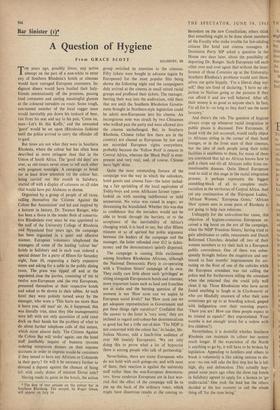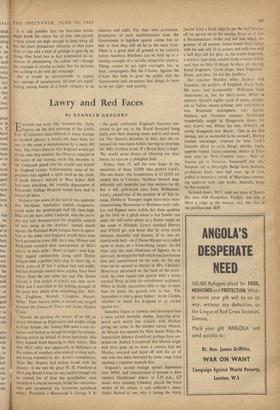Bar Sinister Or
A Question of Hygiene
MEN years ago, possibly fdwer, any active 1 attempt on the part of a non-white to enter any of Southern Rhodesia's hotels or cinemas would have outraged European customers. In- dignant diners would have hustled their lady- friends ostentatiously off the premises, passing loud comments and casting meaningful glances at the coloured intruders en route. Some tough, sun-tanned member of the local rugger team would inevitably put down his tankard of beer, rise from his seat and say to his pals, 'Come on, man—Let's fix this Kaffir,' and the unwanted `guest' would be set upon (Rhodesian fashion) until the police arrived to carry the offender off to gaol.
But times are not what they were in Southern Rhodesia, where the colour bar has often been described as more stringent than that in the Union of South Africa. The 'good old days' are over, as old-timers never cease to tell each other with poignant nostalgia. A campaign to break (or at least draw attention to) the colour bar, being carried out this month in Salisbury, started off with a display of calmness on all sides that would have put Alabama to shame.
Organised by a group of people of all races, calling themselves the 'Citizens Against the Colour Bar Association' and led and inspired by a lecturer in history, Dr. Terence Ranger, who has been a thorn in the tender flesh of conserva- tive Rhodesians ever since he was appointed to the staff of the University College of Rhodesia and Nyasaland four years ago, the campaign has been organised in a quiet and effective manner. European volunteers telephoned the managers of some of the leading 'colour bar' hotels in Salisbury and in each case ordered a special dinner for a party of fifteen for Saturday night, June 10, requesting a fairly expensive menu and asking for a table in the public dining room. The press was tipped off and at the appointed time the parties, consisting of ten to twelve non-Europeans and the rest Europeans, presented themselves at their respective hotels and asked to be shown to their tables. At each hotel they were politely turned away by the manager, who wore a 'This hurts me more than it hurts .you, old man' air. As it happened, this was literally true, since they (the managements) were left with not only quantities of cold roast duck on their hands but the problem of what to do about further telephone calls of this nature, which occur almost daily. The Citizens Against the Colour Bar will 'strike' again; can the hotel staff justifiably inquire of business tycoons ordering sumptuous dinners on their expense accounts in order to impress would-be customers if they intend to have any Africans or Coloureds in their party? Or will it be necessary further to demand a deposit against the chances of being left with costly dishes of uneaten Dover sole? Having made its point in the hotels, the action * The first of two articles on the colour bar in Southern Rhodesia. The second, by Roger Owen, will appear on July 14. group switched its attention to the cinemas. Fifty tickets were bought in advance (again by Europeans) for the most popular film being shown the following night and the campaigners duly arrived at the cinema in small mixed racial groups and proffered their tickets. The manager, barring their way into the auditorium, told them that not until the Southern Rhodesian Govern- ment brought in Northern-style legislation could he admit non-Europeans into his cinema. An incongruous note was struck by two Chinamen who walked past the party and were allowed into the cinema unchallenged. But, in Southern Rhodesia, Chinese (what few there are in the country) are classed as Europeans by law and are accorded European rights everywhere, probably because the 'Yellow Peril' is remote in Central Africa, whereas the 'Black Peril' is ever- present and very real; and, of course, Chinese have 'light' skins.
Quite the most outstanding feature of the campaign was the way in which the onlookers, hotel guests and cinema fans—the latter includ- ing a fair sprinkling of the local equivalent of Teddy-boys and some Afrikaans farmer types— looked on with seeming indifference or mild amusement. No voice was raised in anger; no threatening fist brandished. Whether this was due to confidence that the intruders would not be able to break through the barriers, or to the acceptance of the inevitability of Africa's changing wind, it is hard to say, but after fifteen minutes or so of spirited but polite argument between the leaders of the campaign and the manager, the latter refunded over £12 in ticket- money and the demonstrators quietly dispersed.
The campaign is causing little excitement among Southern Rhodesian Africans, although the National Democratic Party is co-operating with a 'Freedom Sitters' campaign of its own. They really care little about such 'privileges' as sitting alongside Europeans in hotels and cinemas; more important issues such as land and franchise are at stake and the burning question of the moment is not 'How soon can we aspire to European social levels?' but 'How soon can we get adequate representation in Government and put these things right ourselves?' Confident that the answer to the latter is 'very soon,' they are inclined to regard anti-colour-bar demonstrations as good fun but a trifle out-of-date. 'The NDP is not concerned with the colour bar,' its leader, Mr. Joshua Nkomo, told a lunch-time audience of over 500 (mainly Europeans), 'We are only doing this to prove what a lot of hypocrisy there is among people who talk of partnership.'
Nevertheless, there are many Europeans who do not hold with such goings-on; and with most of them, their reaction is against the university staff rather than the non-European demonstra- tors. Some moderate Europeans are in fact wor- ried that the effect of the campaign will be to put up the back of the ordinary voter, which might have disastrous results at the coming re- ferendum on the new Constitution; others think that something ought to be done about members of the Faculty who make trouble for law-abiding citizens like hotel and cinema managers. A Dominion Party MP asked a question in the House two days later, about the possibility of deporting Dr. Ranger. Such Europeans tell each other over and over again that without the inter- ference of those Commies up at the University, Southern Rhodesia's problems would sort them- selves out quite happily. 'I'm a liberal chap my- self,' they are fond of declaring. 'I have no ob- jection to Natives going to the pictures if they can afford it and are well behaved. After all, their money is as good as anyone else's. In fact, I'm all for it—so long as they don't use the same lavatory.'
And there's the rub. the question of hygiene always crops up whenever racial integration in public places is discussed. Few Europeans, if faced with the fait accompli, would really object to Africans sitting in the corner of their hotel lounges, or in the front seats of their cinemas, but the idea of such people using their toilet facilities is anathema to them, for many of them are convinced that (a) no African knows how to pull a chain and (b) all Africans suffer from un- mentionable diseases. Quite liberal Europeans tend to stall at this stage in the racial integration process; it perhaps represents the biggest stumbling-block of all to complete multi- racialism in the territories of Central Africa. And yet any continuation of the 'European Ladies,' 'African Women,' European Gents,' African Men' system seen in some parts of Rhodesia is not going to help race relations. '
Unhappily for the anti-colour-bar cause, this objection of hygiene-conscious Europeans re- ceived a big boost on the eve of the campaign, when the NDP 'Freedom Sitters,' having tried to gain admittance to cafés, restaurants and Dutch Reformed Churches, detailed off two of their women members to try their luck in a European public convenience. One of them was subse- quently brought before the magistrate and sen- tenced to four months' imprisonment for uri- nating on the floor of one of the cubicles while the European attendant was out calling the police and for furthermore telling the attendant when she returned that she could jolly well clean it up. Those Rhodesians who have never found anything to laugh at in Clochemer/e of who are blissfully unaware of what their son! sometimes get up to at boarding school, gasped with indignation over their morning papers `There you are! How can these people expect tc be treated as equals?' they expostulated. 'Foui months is not enough' (even for a widow witt five children?).
Nevertheless, it is doubtful whether Southerr Rhodesia can maintain its colour bar systen much longer. If the experience of the Nortt is anything to go by, it will have to be broken by legislation. Appealing to hoteliers and others tc break it voluntarily is like asking nations to dis arm—no one will take the first step lest he is lef high, dry and defenceless. This actually hap pened some years ago when the three top hotel: in Salisbury agreed to apply for a licence to `gc multi-racial.' One took the lead but the other, decided at the last moment to call the whole thing off 'for the time being.' It is still possible that the first-class hotels might break the colour bar of their own accord —their prices are high enough to keep away all but the more prosperous Africans, so they have little to lose and a deal of prestige to gain by so doing. One hotel has in fact announced its in- tention of abandoning the colour bar—though the manager is careful to insist that his decision has nothing to do with the campaign.
But it would be unreasonable to expect any upsurge of spontaneous 'all men are equal' feeling among hotels of a lower category or in cinemas and cafes. For their own protection, proprietors of such establishments want the Government to legislate against colour bar, so that at least they will all be in the same boat. There is a great deal of ground to be covered before Southern Rhodesia can be held up as a shining example of a racially integrated country. Things cannot be put right overnight, but, at least, campaigners like the Citizens Against the Colour Bar help to prod the public and the Government into awareness that things do have to be put right--and quickly.



































 Previous page
Previous page